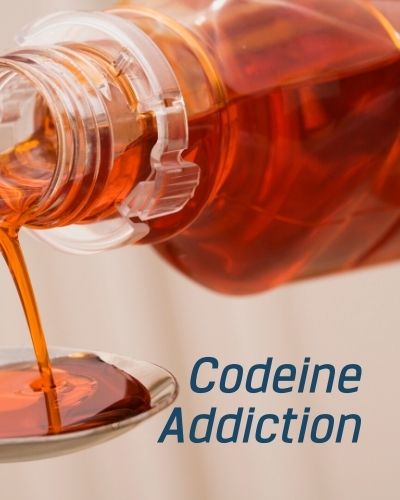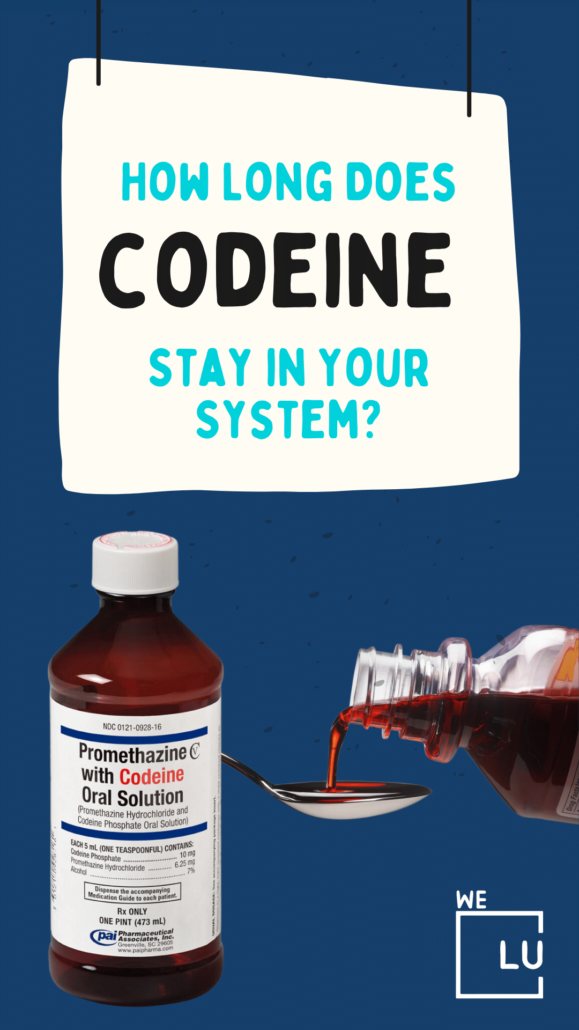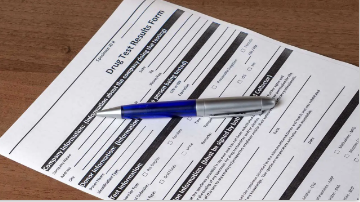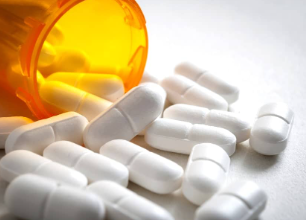How Long Does Codeine Stay in Your System?
Codeine is a medication used in the management and treatment of chronic pain. It is in the opioid class of medications. Codeine is one of the most commonly taken opioid medications. It is at the center of the opioid addiction problem in the United States and thus is highly regulated. Codeine’s main indications are pain and dry cough. It has a half-life of two and a half to three hours. This means that it takes about three hours for half a dose of codeine to be eliminated from your system.
Codeine is detected in screening tests for drugs of abuse for up to three days. Therefore, if you have been Codeine is found in Tylenol #3, Tylenol with codeine, Fiorinal with codeine, Triacin-C, Codate, Tuaistra XR, Codophos syrup, promethazine with codeine cough syrup, and other formulations. Street names include sizzurp, Captain Cody, and purple drank. taking a prescription drug that contains codeine, it’s essential to let your employer or a relevant person know if you’re subject to an employment or forensic drug screen.
How Long Does It Take To Feel the Effects of Codeine?
After taking Codeine, it usually takes about an hour to begin feeling its effects. Codeine changes how your nervous system and brain detect pain and slows down the activity in your brain that creates the cough reaction, which is why it’s used for pain relief and as a cough suppressant.
Codeine is a very addictive drug. Therefore, you must do everything in your power to avoid codeine addiction. One of the best ways is to time your doses right to avoid taking too much at once. The higher the dose or the more often you take the medication, the higher the chance of developing an addiction. Learning how long codeine is in your system makes it easy to plan your doses accordingly.
How Long Does Codeine Stay in System?
How long does Codeine last? Codeine is metabolized mainly by the liver. The drug breakdown produces metabolites, including norcodeine, codeine-6-glucuronide, and morphine. Although the half-life of Codeine is relatively short, these metabolites stay in the system and can be detected in drug screening tests for up to three days.
How Long Does It Take To Feel the Effects of Codeine?
After taking Codeine, it usually takes about an hour to begin feeling its effects. Codeine changes how your nervous system and brain detect pain and slows down the activity in your brain that creates the cough reaction, which is why it’s used for pain relief and as a cough suppressant.
Codeine is a very addictive drug. Therefore, you must do everything in your power to avoid codeine addiction. One of the best ways is to time your doses right to avoid taking too much at once. The higher the dose or the more often you take the medication, the higher the chance of developing an addiction. Learning how long codeine is in your system makes it easy to plan your doses accordingly.
Codeine is metabolized mainly by the liver. The drug breakdown produces metabolites, including norcodeine, codeine-6-glucuronide, and morphine. Although the half-life of Codeine is relatively short, these metabolites stay in the system and can be detected in drug screening tests for up to three days.
How Long Does Codeine Stay in Urine?
Your kidneys eliminate about 90% of the drug in urine. Urine drug tests are the most commonly used drug tests in many settings because they are relatively easy and cost-effective to administer—standard urine screen tests for various drugs, including opiates such as codeine. A positive result on a urine screening usually suggests that an individual has used morphine, codeine, or heroin (all opiates) in the past one to three days.
How Long Does Codeine Stay in Blood?
Blood screenings are used less frequently because they are more costly and invasive than urine tests. However, they may be used when an individual cannot provide a urine sample or confirm an unexpected positive urine test result. The window for detecting Codeine on a blood test is only 24 hours.
How Long Does Codeine Stay in Saliva?
Saliva screening can also be a convenient option. Codeine is detectable in oral fluid for up to four days after ingestion. However, several factors can affect sample collection, including low levels of oral fluid due to a range of physiological factors, including side effects of the drug itself.
Research also suggests that eating candy or chewing gum containing citric acid can significantly lower the levels of Codeine found in saliva.
How Long Does Codeine Stay in Hair?
Codeine use can be detected by a hair follicle test for up to three months. However, use that happened within the last two to three before the test will not be detectable.

Skip To:
- How Long Does Codeine Stay in Your System?
- How Long Does It Take To Feel the Effects of Codeine?
- How Long Does Codeine Stay in System?
- How Long Does It Take To Feel the Effects of Codeine?
- How Long Does Codeine Stay in Urine?
- How Long Does Codeine Stay in Blood?
- How Long Does Codeine Stay in Saliva?
- How Long Does Codeine Stay in Hair?
- Codeine Addiction Statistics
- Codeine Drug Fact
- Factors That Affect Detection Time of Codeine
- Codeine Withdrawal
- Codeine Withdrawal Symptoms
- Long-Term Effects of Codeine Abuse
- Psychological Effects of Codeine Abuse
- Physical Effects of Codeine Use
- Opioid Addiction Treatment
Learn More:
- Mixing Codeine and Alcohol
- Dangers of Cold Water Extraction for Hydrocodone and Codeine
- How Long Does Percocet Stay in Your Urine?
- How Long Does Hydrocodone Stay in Your System?
- How Long Does It Take for Hydrocodone to Kick in?
- How Long Does Hydrocodone Stay In Urine?
- Effects of Hydrocodone and Alcohol
- Percocet Side Effects
- Molly Percocet
- Effects of Lean
- Pain Medication List Strongest to Weakest
Get Help. Get Better. Get Your Life Back.
Searching for Accredited Drug & Alcohol Rehab Centers Near You? Or Mental Health Support?
Even if you have failed previously, relapsed, or are in a difficult crisis, we stand ready to support you. Our trusted behavioral health specialists will not give up on you. Call us when you feel ready or want someone to speak to about therapy alternatives to change your life. Even if we cannot assist you, we will lead you wherever you can get support. There is no obligation. Call our hotline today.
FREE Addiction Hotline – Call 24/7Codeine Addiction Statistics
In 2016, codeine phosphate with pseudoephedrine and guaifenesin was the 241st most prescribed medication in the United States, with more than two million prescriptions. Additionally, a study found that prescriptions for Tylenol, which combines codeine with acetaminophen, increased by nearly 600% as medical professionals looked for alternatives to more potent narcotics. According to the 2016 National Survey on Drug Use and Health, an estimated 11.8 million U.S. residents aged 12 or older — or 4.4% of the population — were current users of prescription opioids like codeine.
33 million
An estimated 33 million people use Codeine every year.
Source: NIH
500,000 people
Almost 500,000 Americans fatally overdosed on Opioids, like Codeine, from 1999 to 2019.
Source: NIDA
48 to 72 hours
This is typically when, after quitting Codeine, withdrawal symptoms are at their height.
Source: NIH
Codeine Drug Fact Sheet
Codeine
Codeine is a medication used in the management and treatment of chronic pain. It is in the opioid class of medications. This activity outlines the indications, action, and contraindications for codeine as a valuable agent in treating chronic pain and off-label use in cough, persistent diarrhea, and restless leg syndrome.
In addition, this activity will highlight the mechanism of action, adverse event profile, off-label uses, dosing, pharmacodynamics, pharmacokinetics, monitoring, toxicity, and relevant interactions pertinent for interprofessional team members in treating patients with chronic pain and related conditions.
FDA-approved Indication
Pain
Codeine plays a role in the treatment of mild to moderate pain. Its use is recognized in chronic pain due to ongoing cancer and palliative care. However, the use of codeine to treat other types of chronic pain remains controversial.
Chronic pain, defined by the “international association for the study of pain,” is pain persisting beyond the standard tissue healing time of three months.[1 The most prevalent causes of non-cancer chronic pain include back pain, fibromyalgia, osteoarthritis, and headache.
Non-FDA-approved Indications
Cough
Codeine is useful in the treatment of various etiologies producing chronic cough. Also, 46% of patients with chronic cough do not have a distinct etiology despite a proper diagnostic evaluation.
Codeine produces a decrease in cough frequency and severity in these patients. However, there is limited literature demonstrating the efficacy of codeine in chronic cough.
Restless Leg Syndrome
Codeine is effective in treating refractory restless leg syndrome when given at night. However, the dose prescribed should be low, and patients should be non-responders to all other standard treatment protocols for RLS.
Persistent Diarrhea (Palliative)
Codeine and loperamide are equally effective, and the choice between them has its basis in assessing the physician evaluating the small but undoubted addictive potential of codeine versus the higher cost of loperamide and an individual difference in a patient’s vulnerability to adverse effects.

False Positive Testing
Eating foods that contain poppy seeds can trigger a false-positive test result for opiates such as Codeine. Poppy seeds may contain trace amounts of codeine and morphine. While not enough to produce the same effects as prescription opiates, research has shown that consuming just one poppy seed muffin or two poppy seed bagels is enough to show up on a standard drug screen.
Additional analysis using methods such as mass spectroscopy can sometimes help differentiate between poppy seed consumption and proper opiate use. Certain medications can also trigger a false-positive test result on drug screening tests.
Verapamil (a calcium channel blocker used to treat hypertension), diphenhydramine (an antihistamine commonly found in cold and allergy medications), and doxylamine (an antihistamine often found in sleep aids and allergy medications) are all known to cause false positives for opiates on enzyme immunoassay (EIA) drug tests.
Let the testing laboratory know if you have eaten anything containing poppy seeds or are on any medications that might affect your test results.

Get Your Life Back
Find Hope & Recovery. Get Safe Comfortable Detox, Addiction Rehab & Mental Health Dual Diagnosis High-Quality Care at the We Level Up Treatment Centers Network.
Hotline (877) 378-4154Factors That Affect Detection Time of Codeine
How long codeine is detectable in a person’s system can vary by person and situation. Several factors can affect this, including:
- The amount of the drug taken
- The individual’s metabolism
- Which formulation of codeine is consumed
- Length of codeine use
- Consumption of other medications or drugs
- Hydration and activity levels
- Age, liver and kidney health, and other physiological factors
For instance, massive doses or prolonged use may extend the time the codeine is in your system. While exact times may vary, below are typical estimates for how long codeine is detectable.
Codeine Withdrawal
Chronic use of codeine can lead to a phenomenon known as physical dependence, the state in which a person adapts to the consistent presence of a drug and experiences a characteristic withdrawal syndrome when they abruptly stop codeine or their use of it considerably slows. As physiological dependence develops, individuals may continue taking codeine to avoid sensations of physical withdrawal.
Codeine Withdrawal Symptoms
When an individual goes through codeine withdrawal, they may experience symptoms such as:
- Runny nose
- Teary eyes
- Yawning
- Sweating
- Dysphoria
- Anxiety
- Goosebumps
- Insomnia
- Fever
- Restlessness
- Muscle and/or bone pain
- Rapid heartbeat
- Stomach cramps
- Nausea and/or vomiting
- Diarrhea
First-class Facilities & Amenities
World-class High-Quality Addiction & Mental Health Rehabilitation Treatment
Rehab Centers TourRenowned Addiction Centers. Serene Private Facilities. Inpatient rehab programs vary.
Addiction Helpline (877) 378-4154Proven recovery success experience, backed by a Team w/ History of:
15+
Years of Unified Experience
100s
5-Star Reviews Across Our Centers
10K
Recovery Success Stories Across Our Network
- Low Patient to Therapist Ratio
- Onsite Medical Detox Center
- Comprehensive Dual-Diagnosis Treatment
- Complimentary Family & Alumni Programs
- Coaching, Recovery & Personal Development Events
Long-Term Effects of Codeine Abuse
Codeine is a narcotic. It is an opiate-based drug hat relieves a patient’s moderate or mild pain. It is a prescription drug found with other medications to reduce coughing. Codeine is a very beneficial medication for treating a variety of pain symptoms, but it can have many severe effects in the long term.
Psychological Effects of Codeine Abuse
Codeine use affects the body by binding to receptors in the brain and blocking pain sensation. It also causes euphoria, which becomes a relaxing and pleasant high. However, the long-term effects of the drug can become concerning, especially those that affect the user’s behavior and mind. Long-term use of codeine can have these psychological effects:
Dependence
If the proper doses of codeine aren’t followed, and the patient starts to use the drug more often, addiction has likely already begun. In addition, there is a strong chance that “use can create psychological dependence.” Many individuals who have used codeine for a long time begin to feel like they need the drug to function.
Depression
Codeine use over time can cause depression. According to a medical study, “two thirds of the subjects had sought help for mental health problems, most often depression” as a result of long-term codeine use
Addiction
Codeine addiction is a real threat for somebody who has been using the drug long-term. Because codeine is habit-forming and causes dependence, people often build up a tolerance to the drug, needing to take more and more in order to feel its effects.

World-class, Accredited, 5-Star Reviewed, Effective Addiction & Mental Health Programs. Complete Behavioral Health Inpatient Rehab, Detox plus Co-occuring Disorders Therapy.
CALL (877) 378-4154End the Addiction Pain. End the Emotional Rollercoaster. Get Your Life Back. Start Drug, Alcohol & Dual Diagnosis Mental Health Treatment Now. Get Free No-obligation Guidance by Substance Abuse Specialists Who Understand Addiction & Mental Health Recovery & Know How to Help.

Physical Effects of Codeine Use
Aside from the psychological effects, Codeine use also has strong physical effects. Because codeine slows down reactions in the body, use of the drug over a long period of time can cause major issues, such as:
Respiratory Depression
This is one of the most severe side effects of long-term codeine use. The person’s breathing becomes incredibly slow to the point of danger. “Difficulty breathing” or “noisy or shallow breathing” can be signs of codeine-induced respiratory depression.
Constipation
Although constipation isn’t always severe, it can cause problems after a long period of time. Codeine use can cause long-term constipation, which may result in other complications.
Risk of Codeine Overdose
Abusing or taking more than the recommended dosage of codeine can lead to an overdose. Even a single misuse can be deadly, but those suffering from a substance use disorder (SUD) are even more at risk of overdosing.
Codeine Withdrawal
Codeine withdrawal peaks at around day five, so you’re likely to feel the most extreme withdrawal symptoms. After day eight, the symptoms become a bit milder. However, they can last upwards of thirty days.
People with codeine dependence or otherwise at risk of experiencing opioid withdrawal can benefit from medical detox and pharmaceutical withdrawal management to ensure their opioid use disorder treatment efforts begin as smoothly, safely, and comfortably as possible.
Experience Transformative Recovery at the We Level Up Treatment Center.
See our authentic success stories. Get inspired. Get the help you deserve.



Start a New Life
Begin with a free call to an addiction & behavioral health treatment advisor. Learn more about our dual-diagnosis programs. The We Level Up treatment center network delivers various recovery programs at each treatment facility. Call to learn more.
- Personalized Care
- Caring Accountable Staff
- World-class Amenities
- Licensed & Accredited
- Renowned w/ 5-Star Reviews
We’ll Call You
Opioid Addiction Treatment
If you think a loved one is abusing drugs or alcohol, you should research the substances and their associated addiction to understand better what your loved one needs. Next, you must plan an intervention to provide your loved ones with options to battle the effects of drug addiction in a safe and supportive environment. During this intervention, offer compassion and support instead of judgment. Lastly, show your support throughout the entire treatment process.
In addition, prolonged drug use can have severe physical and psychological effects on you, so it is essential to seek treatment as soon as possible. To better understand how long hydrocodone stays in your system, it is essential to get medical assistance when needed. Inpatient drug rehab offers intensive care that can help you promptly get through the early stages of drug withdrawal.
Opioid Detox
Medical detox is often considered the first stage of treatment. It will help you navigate the complicated drug detox withdrawal but doesn’t address patterns of thought and behavior contributing to drug use. Various treatment approaches and settings can help provide the ongoing support necessary to maintain long-term sobriety after you complete the drug detox.
Cravings are very common during drug detox and can be challenging to overcome. This often leads to relapse. Constant medical care provided during inpatient treatment helps prevent relapse. Clinicians can give medication and medical expertise to lessen cravings and withdrawal symptoms.
Inpatient Opioid Addiction Rehab
There isn’t one treatment approach or style that will suit everyone. Treatment should speak to the needs of the individual. Inpatient rehab and addiction treatment aren’t just about drug use. the goal is to help the patient stop using drugs and other substances, but drug rehab should also focus on the whole person’s needs.
Addiction is a complex but treatable disease that affects brain function and behavior. When someone or their family is considering different treatment facilities, they should account for the complexity of addiction and the needs of the individual. The objective of attending an inpatient rehab center for addiction treatment is to stop using the drug and re-learn how to live a productive life without it.
Following a full medical detox, most people benefit from inpatient rehab. Inpatient drug rehab can last anywhere from a few weeks to several months. Patients stay overnight in the rehab facility and participate in intensive treatment programs and therapy. Once someone completes rehab, their addiction treatment team will create an aftercare plan, which may include continuing therapy and participation in a 12-step program like Narcotics Anonymous.
Psychotherapy
Many rehab programs will also have early morning classes or programs. Group sessions occur during inpatient rehab, as do individual therapy sessions. Family therapy may be part of inpatient rehab when it’s feasible. Alternative forms of therapy may be introduced during inpatient rehab, like a holistic therapy program, yoga for addiction recovery, or an addiction treatment massage therapy.
Several different modalities of psychotherapy have been used in the treatment of mental health disorders along with addiction, including:
- Cognitive Behavioral Therapy (CBT) – is an effective treatment that involves changing both the patterns of negative thoughts and the behavioral routines which are affecting the daily life of the depressed person for various forms of depression.
- Dialectical Behavioral Therapy – is a comprehensive mental health and substance abuse treatment program whose ultimate goal is to aid patients in their efforts to build a life worth living. The main goal of DBT is to help a person develop what is referred to as a “clear mind.”
- Solution-focused therapy is an approach interested in solutions that can be quickly implemented with a simple first step leading to further positive consequences.
Dual Diagnosis Treatment
Drug abuse and mental health disorders often co-occur. Traumatic experiences can often result in mental health disorders and substance abuse. Dual-diagnosis rehabilitation treats both of these issues together. The best approach for the treatment of dual diagnosis is an integrated system. This strategy treats both the substance abuse problem and the mental disorder simultaneously. Regardless of which diagnosis (mental health or substance abuse problem) came first, long-term recovery will depend mainly on the treatment for both diseases done by the same team or provider.
Medication Assisted Treatments (MAT)
Medication-Assisted Treatments (MAT) for substance use and mental health disorders are commonly used in conjunction with one another. This includes the use of medications and other medical procedures. During your rehab, the staff from your treatment facility will help you identify what caused your addiction and teach you skills that will help you change your behavior patterns and challenge the negative thoughts that led to your addiction. Sometimes, the pressures and problems in your life lead you to rely on substances to help you forget about them momentarily.
Please, do not try to detox on your own. The detox process can be painful and difficult without medical assistance. However, getting through the detox process is crucial for continued treatment. We Level Up provide proper care with round-the-clock medical staff to assist your recovery through our drug addiction treatment program medically. So, reclaim your life, and call us to speak with one of our treatment specialists. Our counselors know what you are going through and will answer any of your questions.
Drug Rehab Near Me
Drug addiction is a condition that can cause significant health problems, such as an overdose. We Level Up NJ rehab treatment & detox center can provide you, or someone you love, the tools to recover from this with professional and safe treatment. Feel free to call us to speak with one of our counselors. We can inform you about this condition and clarify issues like drug withdrawal symptoms. Our specialists know what you are going through. Please understand that each call is private and confidential.

Search We Level Up “How Long Does Codeine Stay in Your System?” Topics & Resources
Sources
[1] Codeine – StatPearls – NCBI Bookshelf (nih.gov)
[2] Safe use of codeine in the recovering alcoholic or addict – PubMed (nih.gov)
[5] Abuse of codeine-containing cough syrups: a report from India – PubMed (nih.gov)
[6] Opioid Addiction | National Institutes of Health (NIH)
[7] DailyMed – CODEINE SULFATE tablet (nih.gov)
[8] Understanding Drug Use and Addiction DrugFacts | National Institute on Drug Abuse (NIDA) (nih.gov)